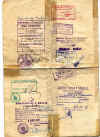
Home
Pilot
Escape
303 Squadron 1
303 Squadron 2
A New Home
and Finally
Links
Contents
| |
Escape...
|
During
September and October, thousands of Polish servicemen, many under very
direct orders from their commanders, left their country. Most went via
Hungary or Rumania. Despite great pressure from the German Ambassador, the
Rumanians were not keen to enforce their internment rules, and Poles
wandered round Bucharest virtually at will. Mirek's photographs, taken in
some back street studio, was the first step in getting a new passport
which would enable him to leave the country.
|

Passport
photo, Bucharest, 1939
|
|
The
Polish Ambassador was operating out of the French Embassy in Bucharest.
There, Mirek received his fake passport, and set about getting the appropriate
visas to leave the country. |
|

Mirek's
original passport |

Mirek's
original passport |
|
Mirek
entered Rumania on 27th September, 1939. His entry visa from the
French Consulate is dated that day until 30th October 1939, "valable
pour un seul voyage" - "valid for only one journey". He got
a holiday visa from the Bucharest Municipal Police on the 10th October and
a transit visa on the 11th October. He crossed the Rumanian border at
Moravita in the west of the country on 14th October, arriving the same day
in Vrsac in the former Yugoslavia. On the 17th October he crossed into
Greece, leaving via Piraeus on the 20th October for France. He finally
arrived in Marseilles on the 28th October. Like so many of his countrymen,
this "travelling salesman" (according to his passport) was now
ready to join the fray again. |
Exile...
| Mirek
reported for duty at the central clearing station of Lyon Bron at the end
of October
1939. In common with tens of thousands of Poles, he felt the intense
frustration of those days. The "phony war" was in full
swing. The French and British had made no efforts to act on their
guarantees to Poland and even now did little but guard France's
borders.
|

Polish
Cavalry, September 1939 |
Back in Poland, small bands of men
had still regrouped to
fight rear guard actions, even when regiment and company strength had been
shattered. His uncles were amongst those
eventually forced to surrender and were taken off into Soviet prisoner of
war camps. The last military fighting took place on 5th October 1939. |
Meanwhile,
unknown to Mirek, his mother and younger sister Marisia took his young
niece and nephew south, to a small village near Jaslo at the foot of the
Tatra Mountains.
Hitler's only visit to
Poland was, strangely, to Zoppot, where he celbrated his victory and the
famous Grand Hotel Casino, yards away from the street on which Mirek was
born.
|

Refugees,
September 1939
|
|

Janka,
1930 |
In Warsaw, his two elder
sisters Halla and Janka were working for the Red Cross, dealing with the
flood of refugees from across the country.
Janka joined the underground resistance,
which though initially unable to do much except hide and protect those
most sought after by the Germans and the Soviets, was to prove so
irresistibly romantic (if not quite potent) a force in 1944. |
|
Back
in France, some
Polish
flyers did get assigned to the so called "Chimney Flights",
and others flew with the few all Polish squadrons, although at all times
under the command of the French. Others, like Mirek, opted for transfer
to England to join the RAF Volunteer Reserve. After
several months kicking his heels, Mirek arrived at
RAF Eastchurch on 18th February 1940. A month later, he was in Blackpool. After further training, including
language lessons, he waited for the call to an active squadron. |
|
